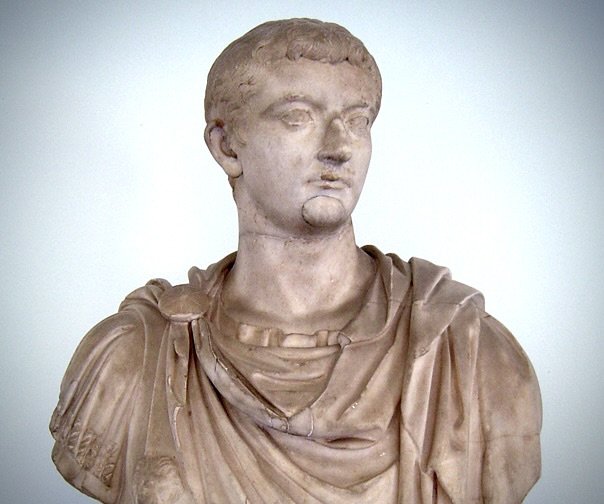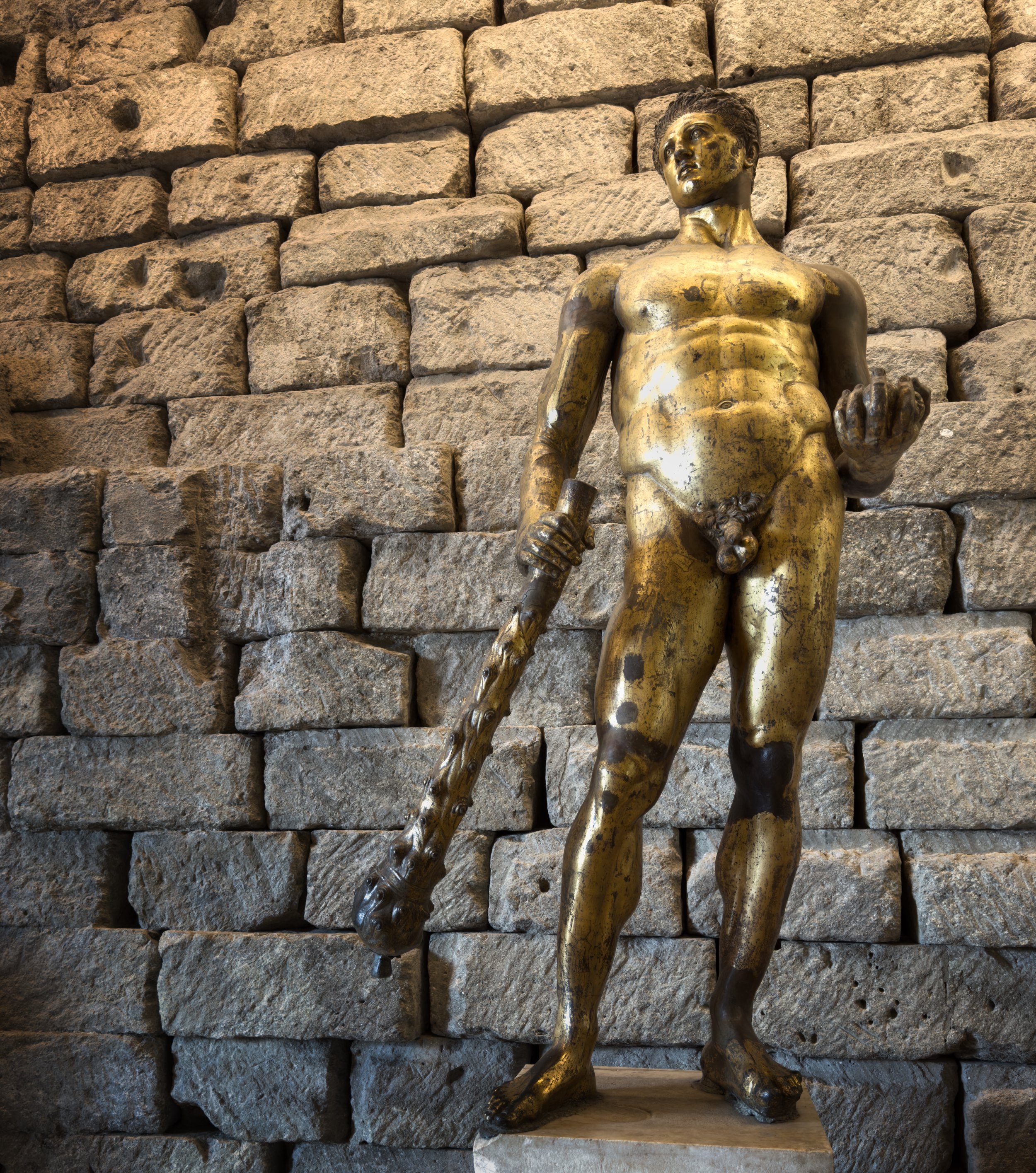TIBERIUS GRACCHUS - PART I
Tiberius Sempronius Gracchus was born sometime around 169 BC. His family was the pinnacle of wealth and celebrity in Rome. His late father had twice been consul and was twice feted for military victories with a triumph; a rare, elaborate, highly desirable accolade. His mother Cornelia was the daughter of Scipio Africanus, the hero of the Second Punic War who defeated the scourge Hannibal at the Battle of Zama. She was the very model of Roman womanhood. Tiberius’ sister Sempronia was married to Scipio Aemelianus, one of the premier generals of the day.
In Rome, the measure of a son was how well he furthered the family legacy by meeting or exceeding his father’s accomplishments. Cornelia told Tiberius and his younger brother Gaius that she longed for the day when she would not be known as the mother-in-law of Scipio Aemelianus, but rather the mother of the Gracchi brothers. Even before he was born, great things were expected of Tiberius.
Bronze statue of Hercules, believed to have been dedicated by Scipio Aemelianus, brother-in-law of Tiberius Gracchus
In his early 20s, Tiberius accompanied his brother-in-law Aemelianus on the sole campaign of the Third Punic War. This saw the utter destruction of Carthage. By some estimates, nearly half a million city residents died and 50,000 were enslaved as Rome lay waste to the city and dismantled it brick by brick. Tiberius was awarded for bravery in this conflict and soon leveraged this honor to kick off his political career.
The mother of the Gracchi brothers, Cornelia, was wealthy beyond belief, but regarded her sons as her most valuable assets, calling them “my gems.”
Several years later he was elected to the magistracy as a quaestor, a position that handled matters of the treasury. In this role, he served under the consul Gaius Mancinus during the Numantine War in modern-day Spain. Rome wanted to bring the recalcitrant mountain tribes of that area under its control. Unfortunately, Mancinus soon found his forces surrounded by the hostile Numantines. Certain death awaited 20,000 Roman soldiers until the attackers learned that Tiberius Gracchus was present. They had favorable memories of his father, the former consul who had treated them fairly several decades earlier. Tiberius was able to negotiate a surrender and 20,000 Roman legionaries walked free.
Rather than a hero’s welcome, Tiberius was met with scorn by the political elite upon his return to Rome. It was shameful for a Roman to surrender. Better to fight and die than to yield, their thinking went. Most of the vitriol was directed at Mancinus, however, who was returned to the Numantines naked and in chains (they said ‘no thanks’ and sent him back). Tiberius felt his share of the wrath, though, and saw his nascent political career crumble before his eyes.
Or so it would seem. While Tiberius had alienated the aristocracy, a powerful constituency flocked to his side: the populari - the everyday, usually poor, people of Rome. This contingent was led by the families of the 20,000 soldiers whom his efforts had saved. Channeling this support, Tiberius was elected Tribune of the Plebes a few years later.
The farm was central to life in the Roman Republic
On his travels through the empire (small ‘e’ at this time), Tiberius had noted with sadness that the Roman farmer was in danger of going extinct. Instead of families tilling their land, he saw vast estates owned by the wealthy and worked by slaves. The individual farmer had been the backbone of traditional Roman society. The hero Cincinnatus notably gave up absolute power to return to farming his land. No job was more honorable. Or at least that was the thought for many centuries of the Republic.
Tiberius’ interest wasn’t simply nostalgic, though. There was a detrimental impact to the decline of the farmer. At this time, only land-owning men could serve in the Roman military, being the only ones who could afford the necessary gear such as horses, armor, swords and shields to fight. In centuries prior, Roman war was nearby, seasonal and timed to avoid planting and the harvest. But as the empire was expanding in the 2nd century BC, campaigns could last for years. Land-owning men who served in the military would return home years later only to find their farms in ruins or scooped up by opportunistic elites for a fraction of their value. This not only led to an influx of homeless veterans and their families into the city of Rome, but also diminished the strength of the army. Without land, a man couldn’t serve.
Generic ruins that have some relation to Tiberius Gracchus, as far as you know.
In his position as Tribune and with the support of his father-in-law, Appius Claudius Pulcher, a Senator and former consul, Tiberius resolved to do something about this and proposed a land reform bill to the Senate that would enfranchise these veterans with a plot of land for their service. The Lex Agraria wasn’t a new law; it had been on the books for centuries. It limited the amount of land a person could own to 500 jugera, or approximately 300 acres. However, this law was widely ignored and unenforced. Therefore, many people owned much more land, having squatted on public lands acquired via conquest over the 2 or 3 centuries since the original law was passed.
And among these squatters were large numbers of Senators. They vehemently opposed resurrecting the Lex Agraria. In many cases, their ancestors had developed the extra land they’d seized, so they stood to lose financially for an overreach they had no part in.
Tiberius soon saw that getting the Senate to propose his bill to the Assembly (remember - the Assemblies passed the laws), was impossible even with a handful of Senators on his side, so he took the unconventional step of introducing the law directly to the Assembly. This was legal but highly unusual and violated mos maiorum, (mos MAI or um) or “the ways of the ancestors,” a collection of unwritten rules and customs that constituted social norms.
The bill was wildly popular with both the populari and members of the Assembly, however. So Tiberius introduced the legislation. Passage seemed assured. The veterans would finally get their due. The time came to read the bill before the final vote.
But then came the word: Veto!
This Latin word for “I forbid” was shouted by Marcus Octavius, a fellow Tribune of the Plebes who exercised his power to block a vote. Despite his duty to serve the interests of the people, he was an aristocrat who owned significantly more land than 500 jugura and stood to lose financially if the bill passed. He also represented the interests of the optimates - the wealthy, the Senators, the aristocrats.
Tiberius pleaded with him to withdraw his objection, even offering to compensate him for lost revenue from his own personal fortune. Octavius was resolute in maintaining his veto, however. This also violated mos maiorum. It was customary to withdraw a veto after registering the initial objection so the people’s business could proceed.
At this point, things began to escalate. Tiberius would not back down, either. To force Octavius’s hand, Tiberius exercised his veto, grinding to a halt all other public business. This was unprecedented.
It was 133 BC and Rome had stopped functioning. Centuries-old norms were collapsing. The populari were riled up. The optimates were inflamed. Tensions between them approached explosive levels. The city was on tenterhooks, waiting anxiously to see how this impasse resolved.
It was then that Tiberius took even more drastic steps, ones that would ignite Rome and herald arguably the most dramatic turning point in its history.
Continued in Part II






